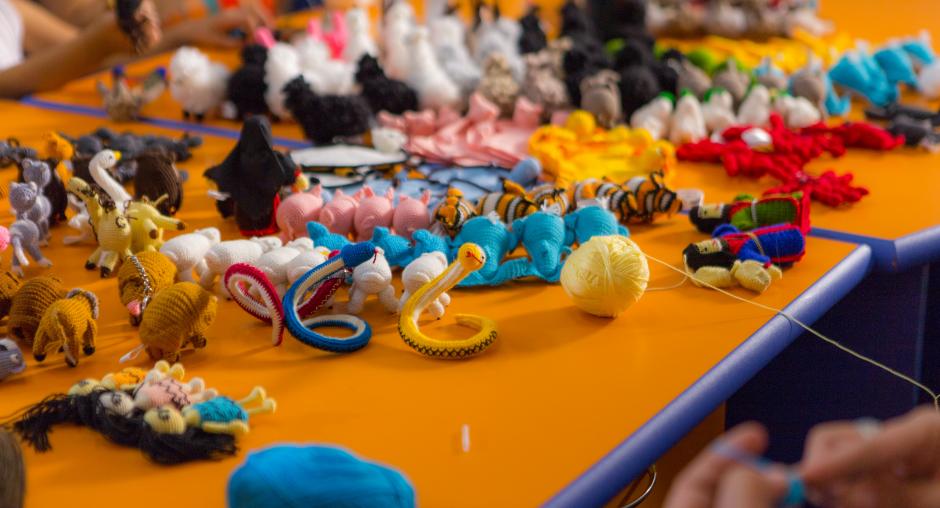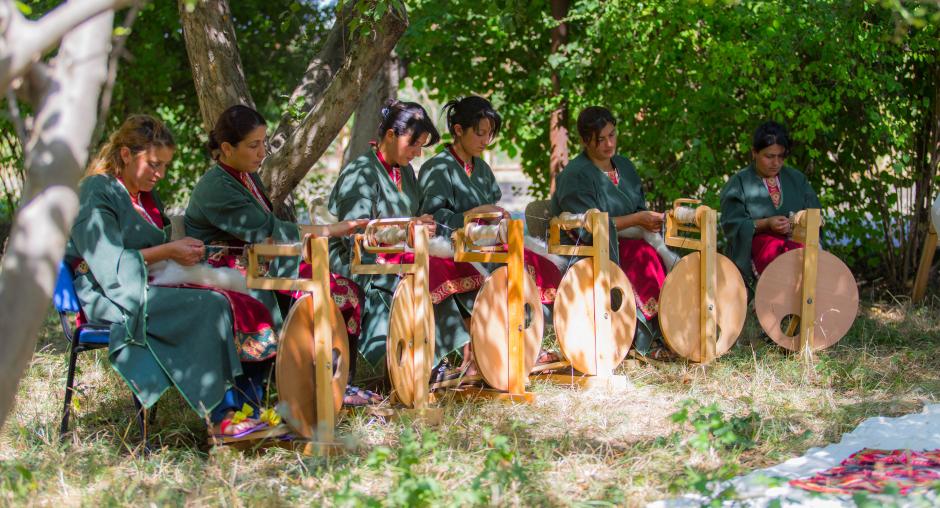Crafting a better future for Armenia’s women
The economic empowerment of women is one of the most important contributing factors to achieving gender equality and to reducing poverty. Yet women’s opportunities for earning money are hindered by high unemployment or stubborn patriarchal attitudes.
A project in Armenia is helping women overcome these challenges and getting them involved in producing handicrafts. Women therefore have an opportunity to earn money and, at the same time, work from home.
This is an ideal solution for mother-of-six Zari Grigoryan, from the village of Shinuhayr in Armenia’s southern region of Syunik.
“Five of my children are currently at school and my youngest child is eighteen months-old. My husband is a farmer and I stay at home to look after children,” she says.
Despite her family commitments, Zari is still able to get down to her work of spinning wool in the early morning before taking her children go to school, and at night after she has put them to bed.
Her story is typical for the region. Syunik is one of the most remote areas of the country, with a population of 150,000 people, and where unemployment is high. Two-thirds of the registered unemployed people are women. Additionally in many households, the male member of the family has gone abroad in search of work, leaving women to bear the burden of looking after children.
Giving women earning power
Since 2009, handicraft studios have been helping women like Zari enter the world of employment. The 'Wool to Carpet' handicraft studio in Shinuhayr, where Zari works, was established in 2014. It is one of many in the region, employing 120 women in wool washing, spinning and in making carpets and carpet products. In addition to carpet-making, women are also involved in pottery and crocheting.
The clubs are all run by Women Resource Centres established with the help of the Office in Yerevan as part of OSCE’s commitments on gender equality.
“Thanks to carpet weaving, I create not only beautiful products, but also earn money,” says mother-of-two Anna Navasardyan, who recently started attending a handicrafts club in Sisian. “My husband left for Russia to work, but has not sent back any money yet.”
“I would like to continue my work at the Handicraft Club to pay for food and things my children need for school,” she says, recalling that she spent her first salary on shoes for her children.
A rich skillset
Women haven’t always been shut out of employment in this region. In Soviet times, the region supported a mining industry and other factories, which provided women with an abundance of work. Although the factories have long since gone, this manufacturing legacy has left women with a rich skillset.
Roza Hovhannisyan worked at a carpet-making factory in Meghri for eleven years. Health problems mean she can’t work anymore but she’s helping the current working generation of women to become more employable.
“I share my knowledge with the beginners. I enjoy making carpets. It makes me feel important. I am proud that Armenian carpets are popular with foreigners. In addition, I can earn money to meet my needs,” she says.
The OSCE Office in Yerevan also helps to enhance the skillsets of women by organizing practical training courses led by local specialists as part of its two-year Development of Handicraft Project, which started in 2013. The training workshops have given women-artisans the opportunity to improve their handicraft skills, learn about traditional Armenian ornaments and combine them with modern motives. As a part of the project, experts from the Netherlands visited the handicrafts clubs to share their knowledge and experience.
Going international
As well as getting women involved in making the products, the project also encourages women to develop business connections and find buyers, thereby developing an entrepreneurial spirit.
Representatives of the Women Resource Centres participated in a trade fair in Frankfurt am Main, Germany, from 29 August-1 September 2015.
The Goris Handicraft Club received a number of orders and interest from buyers across the world, stretching from Scandinavia through to Asia’s Far East.
Ruzanna Torozyan, a coordinator with the Development of Handicraft Project in Syuniq said that finding markets outside Armenia is an important step towards supporting the handicraft business to become sustainable.
“Today we export some of our products to European countries. This not only ensures sustainable income for the members involved in the project but also gives the opportunity to engage more women,” she said.









